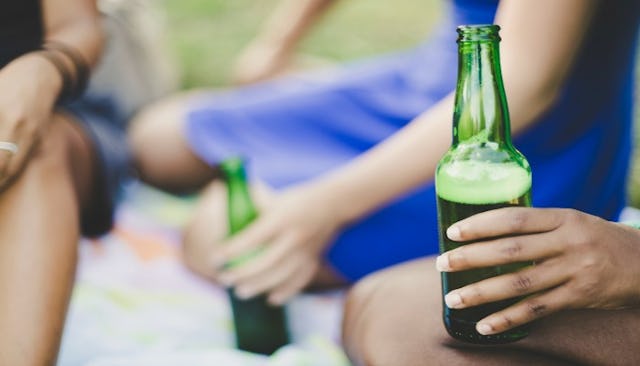The Teen Drinking Talk You Need To Have

“So, Mom, there’s this party I want to go to on Saturday night…”
The first time I heard my teenage daughter utter this sentence, we were on a Starbucks run toward the end of her eighth-grade year. All was sunny and bright in our little world, but with the word “party,” my carefree mood came to a screeching halt, along with my Buick, at the next light. My high-alert parenting brain switched on: Whose party? Where? Will the parents be home? Will there be drinking?!
I tried to keep my cool while gripping the steering wheel and pretending I hadn’t heard her as we drove on. I even turned up the radio in the middle of the worst Kesha song ever.
“Mom? The party?”
I pulled into a parking spot, turned off the engine, and turned toward my daughter in the passenger seat. While my husband and I had made it clear that alcohol is for adults, we’d never actually laid out the facts, expectations, and consequences of teen drinking. Clearly, now was the time.
“Okay, tell me about his party,” I said.
The girl having the party was a friend of a friend, and she’d sent out the invite via Instagram. My daughter didn’t know if the girl’s parents would be home and didn’t even know her address. I held my tongue, fighting the urge to shut the whole business down while she claimed that all of her friends were going and she couldn’t possibly be the loser kid who missed the party.
When she was done making her case, I asked the one question we hadn’t covered, even though I pretty much knew the answer: “Will there be alcohol?”
She looked into her lap and said, “Honestly, Mom, I don’t know, but probably.”
And there you have it. At 13, my daughter was old enough to encounter alcohol, but certainly not experienced enough to handle it or understand the consequences of drinking too much or of being around kids who do. While I’d love to live in a world where my daughter never touched a drop of alcohol until her brain was fully developed and she knew how to deal with it, the reality is that teens experiment with drinking. I certainly did at her age.
Now, as a parent, it’s my job to educate my daughter about the effects of alcohol and let her know where I stand. While no amount of lecturing by me can stop her from drinking, I want my daughter to have the information she needs to eventually make reasonable, safe choices. Ultimately, whether she drinks or not is up to her.
I started out stating the obvious: Underage drinking is illegal and laws are in place for a reason. To that end, I let my daughter know we will never be those parents who buy alcohol for her or her friends, or allow them to drink under our roof because at least we’ll know about it. That’s when I got the first eyeroll that let me know just how uncool I was. Fine.
Next, I pointed out that copious alcohol intake kills your brain cells, and it’s a really bad idea to mess with your brain while it’s still growing. Plus, if you drink too much, you’ll probably barf and have a terrible hangover the next day. Finally, I reminded her that when you’re drunk, it’s really, really hard to make good decisions. Getting into a car with a drunk driver or leaving your annoying friend behind at the party are bad decisions.
Probably the scariest fact I mentioned was the role alcohol plays in assault and rape. Being drunk doesn’t give anyone the right to hurt or touch you under any circumstances, but that doesn’t mean a potential attacker won’t try if you — or they — have had too much to drink. If the action becomes physical without your consent or if you want to stop what’s going on but the person you’re with won’t stop, being drunk makes it a whole lot harder to fight back or call for help.
When I’d finally finished my speech, the silence between us was thick. I could see the concern and worry on my daughter’s face, even as she tried to be nonchalant.
“What if I do drink mom?” she said. “What if I get into trouble?”
That’s when my heart melted for my girl. Growing up is hard. Trusting yourself takes trial and error. Sometimes you kick ass, and sometimes you fail miserably. I’m in my 40s, and I’m still learning. What makes it easier is having a person who is always on your side, ready to pick you up and give you a hug, even if you end up being grounded for the next month.
“If you’re ever in trouble, you call me. No matter what,” I said, taking her hand. “And if you need to throw me under the bus, say that your insane mom is texting and you need to go, then you can do that too.”
Of everything I’d said about drinking, this was the most important. I want my daughter to know she can trust me even as she’s learning to trust herself. If we can just keep the lines of communication open, we’re winning.
“Thanks, Mom,” she said, smiling. “I guess I have to figure out if I even want to go to this party.”
“Yep,” I said, thrilled she was willing to give the party more thought. “Let’s figure it out together over Frappuccinos.”
This article was originally published on